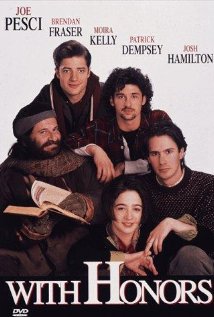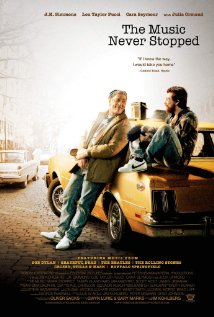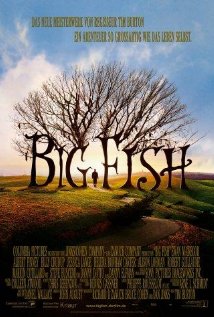Tags
be yourself, catechesis, Catholic, cinema, Conversion, death, dying, friend, Healing, helping others, homelessness, kindness, ministry, movie, movie ministry, obituary, Storytelling
 Monty: Why did you say that I was a loser?
Monty: Why did you say that I was a loser?
Simon Wilder: Winners forget they’re in a race, they just love to run. You try too hard.
Monty: Simon wrote his own obituary, and he asked me to read it. “Simon B. Wilder bit it on Wednesday.”
[they laugh]
Monty: “He saw the world out of the porthole of a leaky freighter, was a collector of memories, and interrupted a lecture at Harvard. In 50 years on earth he did only one thing he regretted. He is survived by his family: Jeff Hawks, who always remembers to flush; Everett Calloway, who knows how to use words; Courtney Blumenthal, who is strong, and also knows how to love; and by Montgomery Kessler, who will graduate life with honor, and without regret.”
Quotes borrowed from: http://www.imdb.com/title/tt0111732/quotes?ref_=tt_trv_qu
Years back, I got the opportunity to spend a semester in Rome. In preparations for the trip, a student who had been the previous semester was advising the group of us to make sure we really took in the sights we were going to be encountering; clarifying that he saw too many people who were so focused on capturing the sights through the lens of a camera and not ever stopping to just take in the beauty that the camera can’t capture. That same advice would have been ignored by our lead character, Monty, played by Brendan Frasier until a series of events brings the homeless Simon Wilder, played by Joe Pesci, into Monty’s life. Simon, on the other had – would have been content to catalog his experiences in a series of rocks, rather than miss the breathtaking scenes around him.
With Honors begins with Monty meeting with a professor about his thesis and Monty is assured that if all continues on the path he will graduate Summa Cum Laude. But, when a computer meltdown sends him running to copy his only hardcopy of the first ten chapters, Monty manages to drop his precious thesis and it falls into the boiler room of Harvard’s Widner Library. So, Monty sneaks to get his paper only to find it being tossed page by page into a furnace by Simon. They strike a deal, that for each good thing Monty does for Simon, he gets one page of his precious thesis. It is through this process that not only does Monty learn to see life as something more than a series of tasks, but he also learns that even a homeless bum is a human and therefore precious.
So, I’ve already told you to two of the biggest lessons…but how, and what else can we pull out of With Honors?
1. There’s nothing wrong with achievement, but don’t lose yourself along the way. Whatever it is that drives Monty, his childhood, his desire to do good in the world or the desire to be the best; he’s so bogged down in the academic that he’s missing college life, ignoring his feelings and not seeing the good he could do now. Monty’s page-by-page interaction with Simon forces him to slow down and to re-evaluate life (and his thesis).
2. All human life is precious. Simon is a bum. He’s well-travelled and self-educated, but for whatever reason, is a homeless wino who left his wife and young son many years prior. Monty starts off helping him only because his thesis is being held for ransom. Monty’s roommates don’t want anything to do with him…he is ridiculed by one of Monty’s professors and basically everyone he encounters. While visiting his son, a little girl comes running out and asks her daddy (Simon’s son) who the man in their driveway is, to which he replies “nobody.” But Simon is human, as are all those who are in similar straits as well as the affluent. One of Monty’s roommates, Jeff, is particularly scared by Simon. Finally Simon calls him on it telling him that the reason Jeff doesn’t like him is because Simon looks how Jeff feels. I wonder if that’s true for a lot of us…
3. The best relationships come from friendship. Monty is in love with his roommate, Courtney. They are obviously very close friends… but with a little push from Simon, Monty finally lets Courtney know how he feels.
4. You can do your best to right your wrongs, but people may still hold a grudge. Simon goes to visit his son and it’s pretty clear that his son isn’t about to “forgive and forget.” But, you can only do so much. Maybe, if Simon could have lived longer he’d have seen a true reconciliation with his son. But, given the constraints of his life, he didn’t have much choice. So, you have to do what you can do… but in the end, you have to live with the consequences and forgive yourself when there’s nothing else left. The other line behind this is – do what you can not to have to right any wrongs.
5. Sometimes the biggest regrets are not the things you’ve done, but the things that are left undone. How often do you wish you’d taken a chance? What about telling someone special how you feel? It takes a little prodding, but finally Monty gets it. Simon finally goes to see his Son. It didn’t go well, but he did it, he got to see his granddaughter. Maybe if he could have stepped up the pace a little – things might have gone differently. In any case, I’m not saying that you need to jump on every opportunity or chance for change that breezes past. We do need to make decisions about which ones are really important, and which ones we need to allow to float past. Maybe the question to ask yourself is “Will this be something I will really care about in 5, 10 or 20 years?”
6. Write your own obituary. In the film, Simon has a collection of obituaries and is studying them to write his own. Simon actually writes that he “bit it” and lists that he left his wife and son, owning up publicly to something he could easily have chosen to keep private, sort of a public confession. Have you ever thought about your obituary? What points of your life would you want in print? Does your family know what to put in for you? Take the time to write it. Does it make you see your life differently? Does it make you feel like you’re busy for nothing? You might find it helpful in prioritizing your life, but maybe it can also be something that can help your family in the event of your demise. Hopefully, you’ll get to revise it MANY times before such an event happens, but none-the-less, it might be a great starting point for that end of life planning you’ve been putting off.
With Honors is PG-13 for good reason. The “end” of Monty’s friendship with Courtney is left to the imagination although they are in bed together at one point. There is a quick shot of Monty’s rear when he jumps out of bed to help Simon. Other than that, there are a lot of sex jokes and innuendo that infiltrate most of the movie. But, if you’re wavering, I’d say the lesson learned is important enough to make it worthy. It might also be that you could use clips to illustrate certain points about seeing others as human and how we can help each other.


